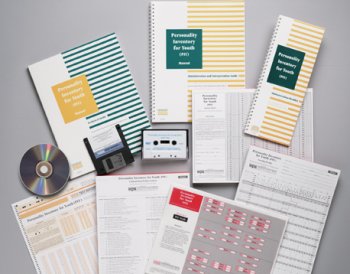by David Lachar, Ph.D., and Christian P. Gruber, Ph.D. | |
 | |

In the tradition of the highly regarded Personality Inventory for Children, Second Edition (PIC-2), this self-report measure assesses psychological problems in 4th- through 12th-graders. The Personality Inventory for Youth (PIY) answers the need for a multidimensional, psychometrically sound self-report instrument designed specifically for young people. |
In the tradition of the highly regarded Personality Inventory for Children, Second Edition (PIC-2), this self-report measure assesses psychological problems in 4th- through 12th-graders. The Personality Inventory for Youth (PIY) answers the need for a multidimensional, psychometrically sound self-report instrument designed specifically for young people. |
The PIY assesses emotional and behavioral adjustment, family interaction, and neurocognitive and attention-related academic functioning. Excellent response validity checks make the test useful in ruling out psychiatric problems. It is composed of 270 items covering 9 nonoverlapping clinical scales and 24 nonoverlapping subscales: |
The PIY assesses emotional and behavioral adjustment, family interaction, and neurocognitive and attention-related academic functioning. Excellent response validity checks make the test useful in ruling out psychiatric problems. It is composed of 270 items covering 9 nonoverlapping clinical scales and 24 nonoverlapping subscales: |
• Cognitive Impairment | • Somatic Concern | ||||
Poor Achievement and Memory | Psychosomatic Syndrome | ||||
Inadequate Abilities | Muscular Tension and Anxiety | ||||
Learning Problems | Preoccupation With Disease | ||||
• Impulsivity/Distractibility | • Psychological Discomfort | ||||
Brashness | Fear and Worry | ||||
Distractibility and Overactivity | Depression | ||||
Impulsivity | Sleep Disturbance | ||||
• Delinquency | • Social Withdrawal | ||||
Antisocial Behavior | Social Introversion | ||||
Dyscontrol | Isolation | ||||
Noncompliance | |||||
• Family Dysfunction | • Social Skill Deficits | ||||
Parent-Child Conflict | Limited Peer Status | ||||
Parent Maladjustment | Conflict With Peers | ||||
Marital Discord | |||||
• Reality Distortion | |||||
Hallucinations and Delusions
The 24 subscales reveal more specific clinical content, making the PIY an excellent diagnostic tool. In addition, 4 validity scales help determine whether the respondent is uncooperative or is exaggerating, malingering, or responding defensively, carelessly, or without adequate comprehension.
Written at a third-grade reading level, the PIY can be completed in just 45 minutes. (An audio CD is available for poor readers, and a Spanish Administration Booklet for those who read Spanish only.) The first 80 items of the test can be used as a brief classroom screener to quickly identify students who would show problems if the full inventory were administered.
Standardized on a nationally representative sample of more than 2,300 students in grades 4 through 12–and developed using a clinical sample of more than 1,100–the PIY gives you a reliable and valid measure of child and adolescent psychopathology, based on the respondent’s own perceptions.
The PIY offers the following features:
A broad survey of behavior, emotion, and social adjustment, focusing on both home and school
Norms based on a sample of 9- to 19-year-olds
3rd-grade reading level, with an audio cassette for problem readers
Student-derived validity scales that alert you to problem denial, exaggeration, and random or incompetent responding
Subscales to enhance scale interpretation
The option of supplementing the PIY self-report with a parallel parent inventory (the PIC-2) and a teacher problem checklist (the SBS).
Component
HAND-SCORING KIT
Includes 1 Manual (Administration and Interpretation Guide and Technical Guide); 2 Reusable Administration Booklets; 100 Answer Sheets; Scoring Templates; 100 Profile Forms (male and female); 100 Critical Items Summary Sheets (male and female); 1 Audio CD


